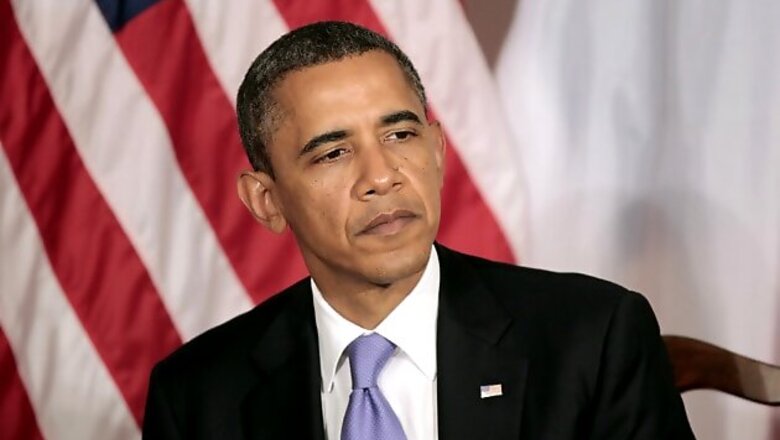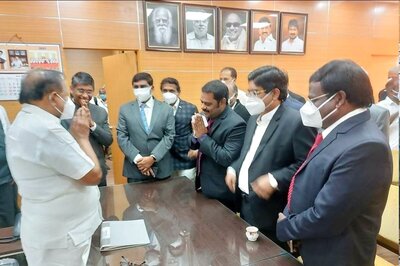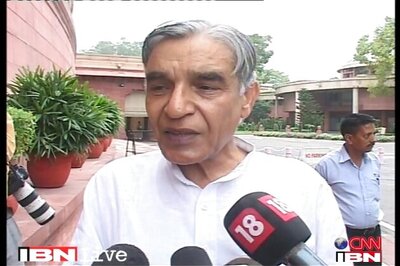
views
Kabul: President Barack Obama slipped into Afghanistan on Tuesday night on the anniversary of the killing of 9/11 mastermind Osama bin Laden and signed an agreement cementing US commitment to the nation after American combat troops leave.
Alongside Afghan President Hamid Karzai, Obama declared, "Together, we're now committed to replacing war with peace."
The partnership spells out the US relationship with Afghanistan beyond 2014, covering security, economics and governance. The deal is limited in scope and essentially gives both sides political cover: Afghanistan is guaranteed its sovereignty and promised it won't be abandoned, while the US gets to end its combat mission in the long and unpopular war but keep a foothold in the country.
The deal does not commit the United States to any specific troop presence or spending. But it does allow the US to potentially keep troops in Afghanistan after the war ends for two specific purposes: continued training of Afghan forces and targeted operations against al-Qaida. The terror group is present in neighboring Pakistan but has only a nominal presence inside Afghanistan.
Obama was also to give a speech designed to reach Americans in the US dinnertime hour of 7:30 pm EDT. It will be 4 am in Kabul when Obama speaks.
He flew to the site of America's longest war not only as commander in chief but also as an incumbent president in the early stages of a tough re-election campaign. Nor were the two roles completely distinct.
His presence was a reminder that since taking office in 2009, Obama has ended the war in Iraq and moved to create an orderly end for the US combat role in Afghanistan.
In the political realm, he and Vice President Joe Biden have marked the one-year anniversary of bin Laden's death by questioning whether Republican challenger Mitt Romney would have ordered the daring raid that penetrated the terrorist leader's Pakistan hide-out. Republicans are accusing the president of politicizing the event, and Romney is insisting that he would indeed have ordered US forces into action.
At a signing ceremony in Kabul with Afghan President Karzai, Obama said the agreement paves the way for "`a future of peace" while allowing the United States to "wind down this war."
Karzai said his countrymen `'will never forget" the help of US forces over the past decade. He said the partnership agreement shows the United States and Afghanistan will continue to fight terrorism together.
Obama was greeted upon arrival at Bagram Air Field by Ryan Crocker, the US ambassador to Afghanistan. Obama then flew by helicopter to the presidential palace in Kabul, where he was to meet with Afghan President Hamid Karzai and sign the strategic partnership.
Officials have previously said as many as 20,000 US troops may remain after the combat mission ends, but that still must still be negotiated.
The United States does promise to seek money from Congress every year to support Afghanistan.
Obama was to be on the ground for about seven hours in Afghanistan, where the United States has been engaged in war for more than a decade following the Sept. 11, 2001, terrorist attacks. The trip carries major symbolic significance for a president seeking a second term and allows him to showcase what the White House considers the fruit of Obama's refocused war effort: the demise of bin Laden.
Air Force One touched down late at night local time at Bagram Air Field, the main US base here.
Media traveling with Obama on the 13-plus-hour flight had to agree to keep it secret until Obama had safely finished a helicopter flight to the nation's capital, Kabul, where Taliban insurgents still launch lethal attacks.
Obama is joining Afghan President Hamid Karzai to sign the agreement that will broadly govern the US role in Afghanistan after the American combat mission stops at the end of 2014 - 13 years after it began.
The president's Tuesday night address was coming exactly one year after special forces, on his order, began the raid that led to the killing of bin Laden in Pakistan.
Since then, ties between the United States and Afghanistan have been tested anew by the burning of Muslim holy books at a US base and the massacre of 17 civilians, including children, allegedly by an American soldier.
Obama's overarching message will be that the war is ending on his watch but the US commitment to its ally is not.
Politics, too, set the tone for what the White House hoped would be a positive message and image for Obama: the commander in chief setting a framework to end the war while reassuring Afghanistan, on its soil, it will not be abandoned.
Aides said the anniversary of bin Laden's killing was not a focus of the trip. But they do not mind that Obama's mission will serve as a reminder, six months before Election Day.
More than 1,800 US forces have been killed and 15,700 more have been wounded in Afghanistan.
The wars in Afghanistan and Iraq combined have cost almost $1.3 trillion. And public support for keeping troops in Afghanistan seems lower than ever.
Obama has gone twice before to Afghanistan as president, most recently in December 2010, and once to Iraq in 2009. All such trips, no matter how carefully planned, carry the weight and the risks of considerable security challenges. Just last month, the Taliban began near-simultaneous assaults on embassies, government buildings and NATO bases in Kabul.
Still, it would have been unusual for Obama to sign the "strategic partnership" agreement without Karzai at his side.
The deal is essential for locking in America's commitment and Afghan's sovereignty when the post-war period comes. Negotiations have dragged as Afghan officials have demanded specific assurances, financial and otherwise.
Both sides have scrambled to get a deal before the NATO conference in Chicago later this month. Negotiators seemed to clear the way for Obama and Karzai by finding agreement over the conduct of night raids and authority over detainees.


















Comments
0 comment